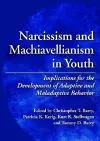
Narcissism and Machiavellianism in Youth
4 contributors - Hardback
£26.99
Christopher T. Barry, PhD, is an assistant professor in the Department of Psychology at the University of Southern Mississippi, Hattiesburg. He received his doctorate in clinical psychology from the University of Alabama, Tuscaloosa, with a specialization in children and adolescents. He completed his clinical internship at the University of Louisville School of Medicine, Louisville, Kentucky.
He currently serves on the editorial board of the Journal of Clinical Child and Adolescent Psychology. Dr. Barry has coauthored a book on the assessment of personality and behavior in children and adolescents and has published numerous book chapters and peer-reviewed journal articles related to child and adolescent clinical psychology.
Specifically, his research interest focuses on risk and protective factors related to child and adolescent problem behaviors, with a particular emphasis on self-esteem, narcissism, and psychopathy. He also conducts program evaluation of a residential program for at-risk adolescents and of a project-based science curriculum for middle school students.
Patricia K. Kerig, PhD, is a professor and the director of clinical training in the Department of Psychology at the University of Utah, Salt Lake City. She received her degree in clinical psychology from the University of California, Berkeley, with a specialization in children and families.
Her research honors include the Brodsky/Hare-Mustin Award from APA's Division 35 (Society for the Psychology of Women) and the New Contribution Award from the International Society of the Study of Personal Relationships.
Currently, she is on the editorial boards of the Journal of Family Psychology®; the Journal of Child and Adolescent Trauma; and the Journal of Aggression, Maltreatment, and Trauma.
She is the author of three books, 26 chapters, 36 peer-reviewed articles, and has been an editor of seven volumes and six journal special issues on topics related to developmental psychopathology and family relations, including interparental conflict, parent–child boundary dissolution, adolescent dating violence, juvenile delinquency, and childhood trauma. She is active in empirical research regarding the interpersonal and intrapersonal processes that contribute to the development of psychopathology and resilience.
Kurt K. Stellwagen, PhD, is an assistant professor of psychology at Eastern Washington University, Cheney. He received his doctorate in school psychology from the University of North Carolina at Chapel Hill in 2006 after completing an internship in clinical psychology at the University of Tennessee Health Science Center, College of Medicine, Memphis.
Dr. Stellwagen serves as a member of the graduate faculty at Eastern Washington University and mentors students pursuing degrees in school, clinical, and experimental psychology.
He maintains an active research program with a primary focus on the mechanisms that link exploitive (e.g., psychopathic and Machiavellian) personality traits with the development and maintenance of interpersonally aggressive behavior. A secondary interest is the role that social intelligence plays in the manifestation of antisocial behavior and delinquency. Dr. Stellwagen has published his research in peer-reviewed psychology, psychiatry, and neuropsychology journals.
Tammy D. Barry, PhD, is an associate professor in the Department of Psychology at the University of Southern Mississippi, Hattiesburg. She obtained her MA and PhD in clinical psychology, with a specialization in children and adolescents, from the University of Alabama, Tuscaloosa. She completed her clinical internship at the University of Alabama School of Medicine, Birmingham.
Dr. Barry has published numerous peer-reviewed articles and book chapters related to child psychopathology, with an emphasis on externalizing behaviors (e.g., attention-deficit/hyperactivity disorder, oppositional defiant disorder, conduct disorder, aggression) and autism spectrum disorders. Specifically, Dr. Barry is interested in exploring contextual and biological correlates, including moderators and mediators, of these disorders. Her research has received federal grant support.